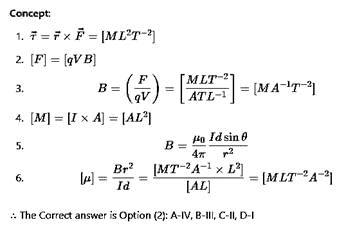Multiple Choice Questions (MCQs): Dimensions of Physical Quantities - NEET MCQ
10 Questions MCQ Test - Multiple Choice Questions (MCQs): Dimensions of Physical Quantities
Identify the pair whose dimensions are equal.
[AIEEE 2002]
The physical quantities not having same dimensions are
[AIEEE 2003]
Which of the following is a dimensional constant?
Dimensions of where symbols have their usual meaning, are
[AIEEE 2003]
Which one of the following represents the correct dimensions of the coefficient of viscosity?
[AIEEE 2004]
Out of the following pairs, which one does not have identical dimensions ?
[AIEEE 2005]
Which of the following units denotes the dimensions [ML2/Q2], where Q denotes the electric charges ?
[AIEEE 2006]
Match List I with List II

The dimensions of magnetic field in M, L, T and C (coulomb) is given as
[AIEEE 2008]
A quantity X is given by  where ϵ0 is the permittivity of the free space, L is a length, ΔV is a potential difference and Δt is a time interval. The dimensional formula for X is the same as that of
where ϵ0 is the permittivity of the free space, L is a length, ΔV is a potential difference and Δt is a time interval. The dimensional formula for X is the same as that of






 = moment of force =
= moment of force = 
 = [L][MLT-2]=[ML2T-2]
= [L][MLT-2]=[ML2T-2]




















